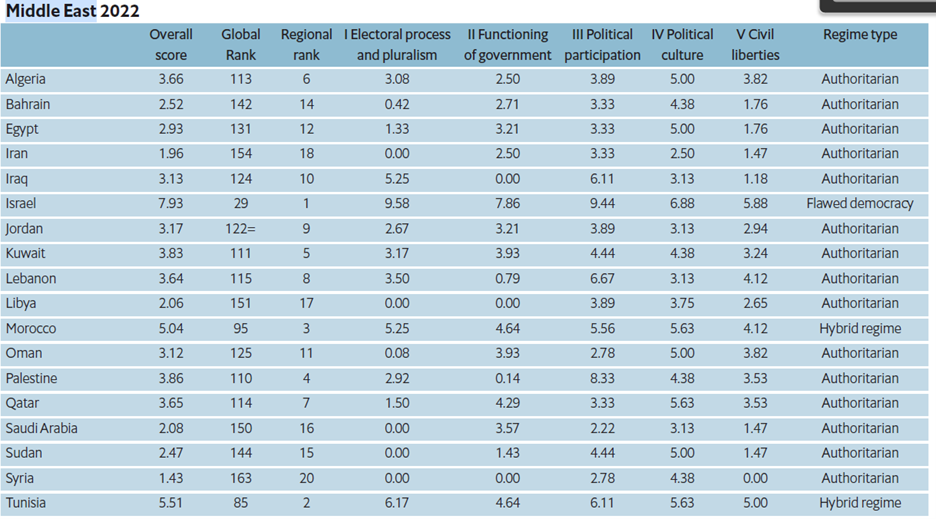
News

Israel a “flawed democracy” in an undemocratic neighbourhood
Israel’s supporters have long claimed that it’s “the only democracy in the Middle East”. But a new study by the United Kingdom-based Economist Intelligence Unit (EIU) has put paid to that, classifying Israel as a “flawed democracy”, albeit in an extremely undemocratic neighbourhood. South Africa, too, is slipping down the democratic rankings.
The focus of the EIU’s “Democracy Index 2022” (published in 2023) is on the global fallout from Russia’s invasion of Ukraine in February 2022 on the back of the damage caused by more than two years of COVID-19 restrictions.
The EIU has been publishing its Democracy Index since 2006, so it’s a useful tool for tracking trends over time. The index measures five main criteria: electoral process and pluralism; functioning of government; political participation; political culture; and civil liberties. All 165 countries are then ranked based on their scores to subsidiary questions as either a “full democracy”, “flawed democracy”, “hybrid regime”, or “authoritarian regime”.
The report says the Middle East and North Africa is “the worst-performing region in terms of its absolute score and its year-on-year score change. Tunisia, Iraq, and Jordan all register sharp declines in their scores.” The regional average dropped from an already low 3.41 out of 10 in 2021 to 3.34 in 2022, worse than the regional average of 3.43 in 2010 before the short-lived Arab Spring.
According to the EIU, the region has no “full democracies”, just one “flawed democracy” – Israel, two “hybrid regimes”, and 17 “authoritarian regimes”. Israel thus lives in the world’s least democratic region.
Israel scores 7.93 out of 10, making it the most democratic in the region by some margin, and 29th overall in the world. It’s the only Middle Eastern country in the top half, while five states in the area are in the bottom 20 places of the index. But Israel is below eight, which would have made it a “full democracy”. Israel is classified as a “flawed democracy”. Israel has very high scores for electoral process, pluralism, and political participation, no doubt a result of its frequent but credible elections.
“Israel’s slippage in the rankings following a small deterioration in its score is primarily attributable to the end of the brief stint in government of the Ra’am Party, the first Arab party to form part of a governing coalition in the country, after the November 2022 parliamentary election,” according to the report.
“Ra’am’s inclusion in the coalition government formed in mid-2021 led to an improvement in the indicator score for citizen control in that year. However, the formation in December of a government led by the conservative, right-wing Likud party and including a number of far-right, ethno-religious, nationalist parties has put an end to this level of representation for the country’s Arab community. There are also concerns that the new government may try to pass a law giving the Knesset (parliament) power to override the Supreme Court, which would undermine the separation of powers and possibly imperil civil liberties in future.”
South Africa scored 7.05 out of 10 in 2022, to place it 45th in the world. It scored only 5.00 out of 10 for “political culture”. In 2006, it scored 7.91 overall, indicating a steady democratic decline. The only specific commentary offered on South Africa by the EIU is that it has witnessed increased public protests. The country is unfortunately not moving in the right direction. Years of state capture have damaged democracy, but the fightback by civil society, the media, and the judiciary saved the country from a much worse fate.
South Africa is also categorised as a “flawed democracy”. African states ahead of South Africa in the global rankings have much smaller populations: Mauritius (8.14, 21st position), Botswana (7.73, 32nd position), and Cabo Verde (7.65, 35th position). Sub-Saharan Africa has one “full democracy”, six “flawed democracies”, 14 “hybrid regimes”, and 23 “authoritarian regimes”, with an average score of 4.14. So, in spite of millions of dollars spent to improve governance over the past two decades, there’s not much to show for it in terms of the quality of democracy.
For comparison, the top 10 most democratic countries are Norway, New Zealand, Iceland, Sweden, Finland, Denmark, Switzerland, Ireland, the Netherlands, and Taiwan, all with scores of 8.99 and above. Democracy clearly seems to thrive in cold, rich places. The bottom 10 are Equatorial Guinea, Laos, Chad, Turkmenistan, Democratic Republic of the Congo, Syria, Central African Republic, North Korea, Myanmar, and Afghanistan. Four are in Africa. The global average score is 5.29, also down from 5.52 in 2006.
The country with the biggest decline over the year was Russia, which managed a score of only 2.28, down from 3.24 in 2021. It scored 5.06 in 2006 in the early years of Vladimir Putin’s rule. This precipitous fall is largely attributed to its invasion of Ukraine in February 2022 and the curtailment of civic space and civil liberties in the country.
So, though Israel and South Africa are among the top performers in their regions and in the world overall, they both have some work to do to raise their scores above eight to be classified as “full democracies”.










